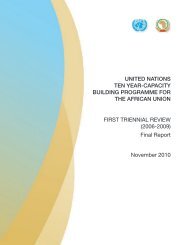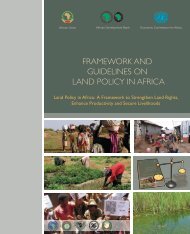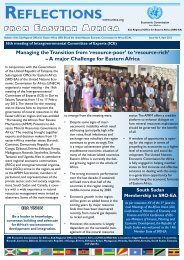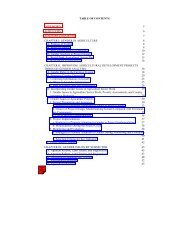A Decade of NEPAD - Economic Commission for Africa - uneca
A Decade of NEPAD - Economic Commission for Africa - uneca
A Decade of NEPAD - Economic Commission for Africa - uneca
Create successful ePaper yourself
Turn your PDF publications into a flip-book with our unique Google optimized e-Paper software.
40 A <strong>Decade</strong> <strong>of</strong> <strong>NEPAD</strong>: Deepening <strong>Africa</strong>n Private Sector and Civil Society Ownership and Partnership<br />
ӹ Promote intra-<strong>Africa</strong>n trade with the aim <strong>of</strong> sourcing<br />
within <strong>Africa</strong>, imports <strong>for</strong>merly sourced from other<br />
parts <strong>of</strong> the world;<br />
ӹ Creating marketing mechanisms and institutions to<br />
develop marketing strategies <strong>for</strong> <strong>Africa</strong>n products;<br />
ӹ Publicize <strong>Africa</strong>n exporting and importing companies<br />
and their products, through trade fairs . . .<br />
Two further private sector related objectives included<br />
increasing domestic resource mobilisation and private<br />
capital flows.<br />
ӹ Increasing Domestic Resource Mobilisation<br />
To achieve higher levels <strong>of</strong> growth and more effective<br />
poverty reduction, <strong>Africa</strong> needs to mobilise additional<br />
resources, both domestic and <strong>for</strong>eign. Domestic resources<br />
include national savings by firms and households, which<br />
need to be substantially increased. In addition, more effective<br />
tax collection is needed to increase public resources,<br />
as well as the rationalising <strong>of</strong> government expenditures.<br />
A significant proportion <strong>of</strong> their domestic savings is lost<br />
to <strong>Africa</strong>n countries as a result <strong>of</strong> capital flight. This can<br />
only be reversed if <strong>Africa</strong>n economies become attractive<br />
locations <strong>for</strong> residents to hold their wealth. There<strong>for</strong>e, there<br />
is also an urgent need to create conditions that promote<br />
private sector investments by both domestic and <strong>for</strong>eign<br />
investors.<br />
ӹ The Private Capital Flows<br />
<strong>NEPAD</strong> seeks to increase private capital flows to <strong>Africa</strong>,<br />
as an essential component <strong>of</strong> a sustainable long-term approach<br />
to filing the resource gap [<strong>of</strong> roughly US$64 billion].<br />
The first priority is to address investor’s perception<br />
<strong>of</strong> <strong>Africa</strong> as a “high risk” continent, especially with regard<br />
to security <strong>of</strong> property rights, regulatory framework and<br />
markets. Several key elements <strong>of</strong> the New Partnership <strong>for</strong><br />
<strong>Africa</strong>’s Development will help lower these risks gradually,<br />
and include initiatives relating to peace and security, political<br />
and economic governance, infrastructure and poverty<br />
reduction. Interim risk mitigation measures will be put in<br />
place, including credit guarantee schemes and the strong<br />
regulatory and legislative frameworks. The next priority is<br />
the implementation <strong>of</strong> a Public-Private sector partnership<br />
(PPP) capacity building programme through the <strong>Africa</strong>n<br />
Development Bank and other regional development institutions<br />
to assist national and sub-national governments in<br />
restructuring and regulating transactions in the provision<br />
<strong>of</strong> infrastructural and social services. The third priority<br />
is to promote the deepening <strong>of</strong> financial markets within<br />
countries, as well as cross-border harmonisation and integration,<br />
via a Financial Market Integration Task Force.<br />
Although presented “<strong>for</strong> illustrative purposes only”, it is<br />
relevant that <strong>of</strong> the three priority projects that were presented<br />
to represent what was needed to strengthen “country<br />
and regional development programmes and kick-start the<br />
regeneration <strong>of</strong> the continent” (along with agriculture and<br />
the promotion <strong>of</strong> infrastructure and regional integration)<br />
the establishment <strong>of</strong> a continent wide initiative to<br />
establish national business incubators (in support <strong>of</strong> the<br />
<strong>Africa</strong>n private sector) that would draw on international<br />
experience and best practice-tailored to <strong>Africa</strong>n needs and<br />
conditions, was also put <strong>for</strong>th.<br />
After ten years <strong>of</strong> implementation there has been progress<br />
in a number <strong>of</strong> the areas put <strong>for</strong>th as objectives <strong>of</strong> the NE-<br />
PAD mission vis-à-vis the private sector, although most<br />
noticeably these gains have been in the area <strong>of</strong> macroeconomic<br />
environment improvement. And while it might<br />
be slightly disingenuous to attribute all <strong>of</strong> these gains exclusively<br />
to <strong>NEPAD</strong>, it is irrefutable that over this period,<br />
particularly among <strong>Africa</strong>’s traditional international donor<br />
partners, the emergence <strong>of</strong> <strong>NEPAD</strong> as the AU programme<br />
<strong>for</strong> economic growth and development toward the achievement<br />
<strong>of</strong> the MDGs has helped focus their overseas donor<br />
assistance in a more harmonised manner.<br />
The rapid economic growth that has been present <strong>for</strong> much<br />
<strong>of</strong> the period during which <strong>NEPAD</strong> has existed in part is<br />
the result <strong>of</strong> a macro-economic re<strong>for</strong>m trajectory begun<br />
by <strong>Africa</strong>n states in the 1980s.<br />
Inflation management, improved monetary policy,<br />
strengthened rule <strong>of</strong> law, protection <strong>of</strong> property rights,<br />
reduction in the cost <strong>of</strong> doing business, technology adoption,<br />
innovation and capital accumulation, democratic<br />
elections, debt reduction and value added export promotion<br />
are some <strong>of</strong> the initiatives that have characterised the<br />
types <strong>of</strong> public sector re<strong>for</strong>ms undertaken.<br />
In addition to the economic re<strong>for</strong>ms, other important<br />
factors which buoyed <strong>Africa</strong>’s economies included higher<br />
international commodity prices, political stability and a<br />
rapid reduction in conflict, and increased government<br />
spending. Debt relief, in particular, under the World Bank’s<br />
Heavily Indebted Poor Countries (HIPC) programme







